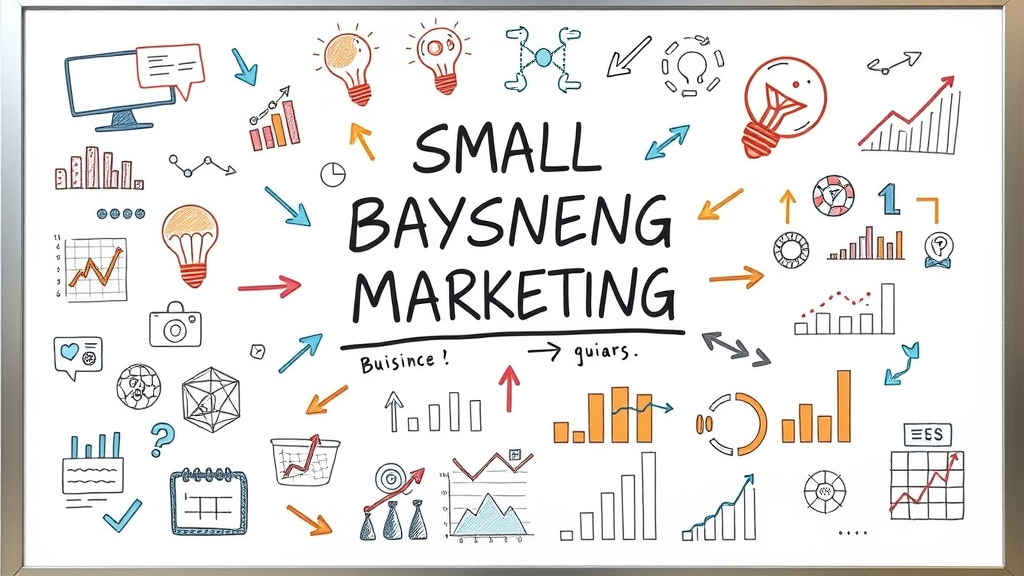Did you know that over 80% of small businesses that invest in a focused marketing plan experience revenue growth far faster than those that don’t? In today’s ever-changing business market, mastering small business marketing isn’t just helpful—it’s essential for survival and success. Whether you’re newly launching your business or ready to scale, the strategies outlined here will move the needle quickly, using a blend of digital marketing smarts, targeted campaigns, and powerful marketing tools. Read on to uncover the unconventional tactics that separate thriving small businesses from the rest and learn how to take actionable steps—starting today.
Small Business Marketing: Surprising Facts and an Urgent Case for Action

- Did you know that over 80% of small businesses that invest in a strong business marketing plan experience significantly faster revenue growth?
- Discover the unconventional tactics separating thriving small businesses from the rest.
Small businesses today face both greater challenges and more exciting opportunities than ever before. Research shows that a robust business marketing approach doesn't just level the playing field—it gives small enterprises the advantage needed to compete with larger competitors. Many business owners are surprised by how fast results can happen when they target their marketing plan to their true target market , embrace digital tools, and iterate quickly. With the business market evolving daily, there’s little room for delay—taking action now can yield surprising gains in brand awareness and customer base growth, setting your company apart from a crowded field.
Furthermore, in an increasingly digital world, the businesses that leverage modern digital marketing channels routinely outperform those relying on outdated word-of-mouth or print advertising efforts. If you’re ready to unlock new levels of business growth and revenue, now is the time to transform your approach. Below, you’ll discover actionable insights and proven marketing strategies that will help you not just survive, but thrive.
As you refine your marketing plan, it’s worth exploring how email marketing can become a cornerstone of your outreach strategy. For a deeper dive into effective email tactics tailored for small businesses, check out the latest insights on email marketing best practices and discover how to nurture leads and boost conversions efficiently.
The Ultimate Guide to Small Business Marketing Success: What You'll Learn
- How small business marketing transforms your business market results
- Critical steps to building a marketing plan tailored for small businesses
- The best digital marketing channels for today’s competitive market
- Top marketing tools every small business marketer should know
- Practical strategies for targeting your ideal audience and market
Understanding Small Business Marketing: What Every Owner Must Know
Defining Small Business Marketing and Its Role in the Business Market

Small business marketing includes the strategies, tactics, and channels that small businesses use to promote their products and services , connect with their target market , and drive revenue. Unlike their larger counterparts, small businesses often operate with limited resources and must select tactics carefully for maximum impact in the competitive business market . Effective small business marketing aligns every touchpoint—from social media and content marketing to paid ads and email campaigns—so that customers easily understand the value proposition.
The role of small business marketing extends far beyond just advertising a product or service—it is rooted in building relationships. By engaging with their target audience through digital marketing, tailored messages, and the right marketing channel, small businesses can cultivate loyal brand advocates, increase lifetime value, and carve out a unique position in their business market. Whether through leveraging new media marketing strategies or refining their approach to traditional promotions, the key is maintaining consistency and authenticity at every customer interaction.
How Small Businesses Leverage Business Marketing for Fast Growth
Smart business owners understand that effective marketing is the fastest route to growth. By identifying the most urgent needs of their target market and responding with tailored marketing efforts, small businesses can rapidly build out their customer base without overspending. The best tactics focus on connecting directly with potential customers through channels they already use—like social media, email marketing , and local search engine listings.
Growth-minded small business marketing isn’t just about immediate gains; it also sets the foundation for long-term brand loyalty. By using content marketing to educate, inspire, and solve customer problems, businesses nurture deeper relationships and encourage positive word-of-mouth, which is invaluable in any business market . Simple but strategic steps, like retargeting ads and nurturing landing page visitors with targeted emails, help ensure ongoing engagement and faster revenue growth.
Building a Small Business Marketing Plan: The Foundation of Success
Setting Clear Goals for Your Small Business Marketing Campaign
Every winning small business marketing journey begins with clear, realistic goals. Without specific targets, marketing efforts become scattered and you risk wasting valuable resources. When designing your marketing plan, begin by asking: What are the most important outcomes for your business? Is it increased brand recognition, more sales leads, or boosting repeat business?
Defining these objectives helps align your marketing strategy with your overall business market goals . Measurable benchmarks—such as a desired increase in website traffic, social media engagement, or new sign-ups from a landing page —let you track progress and stay motivated. Whether you’re aiming to grow your customer base by 20% or increase online conversions through email marketing, the key is to set goals that inspire action and provide a foundation for future efforts.
Identifying Your Target Market and Ideal Customers

Understanding your target market is at the heart of a successful marketing plan . Start by developing detailed customer avatars or profiles that include demographics, purchasing habits, pain points, and motivations. This information enables you to select messaging and marketing channels tailored to your audience—delivering the right message, to the right people, at the right time.
Don’t overlook the value of competitor analysis. Observe who your rivals target, which messages resonate most, and which digital marketing strategies seem most effective. Adapt and improve these strategies for your unique product or service, and always seek to engage with your ideal customer in a more personal, meaningful way. Precision in targeting enhances your marketing effort’s efficiency and drastically improves your return on investment.
Choosing the Right Marketing Channel for Your Small Business
No small business marketing plan can succeed without the right choice of marketing channels . Some small businesses see greater success with organic social media, while others grow through paid ads or direct email marketing. To decide which channels to prioritize, consider where your target audience spends their time—and which platforms drive the most engagement for similar businesses.
For example, if your ideal customer is active on Instagram, a social media marketing campaign using targeted content and stories may yield substantial results. If local search is a priority, boosting your Google My Business presence and optimizing your site for search engine rankings should lead your efforts. Track each campaign closely to learn which channel delivers the best ROI, so you can focus resources accordingly.
| Channel | Goal | Monthly Budget | Expected ROI |
|---|---|---|---|
| Social Media (Instagram, Facebook) | Brand Awareness, Engagement | $500 | 3-4x |
| Email Marketing | Lead Nurturing & Conversions | $300 | 4x |
| Paid Ads (Google, Meta, LinkedIn) | Immediate Lead Generation | $700 | 5x |
| Content Marketing (Blog, Video) | Website Traffic & SEO | $400 | 3x |
Crafting a Winning Small Business Marketing Strategy
Determining Your Marketing Strategy in a Rapidly Evolving Business Market
To compete and win in today's business market , small businesses must choose a marketing strategy that can evolve quickly as trends shift. This means moving beyond “set it and forget it”—constantly analyzing results, embracing new marketing tools, and being agile enough to pivot your messaging or channel approach. Begin by outlining your core business profile , identifying your unique selling proposition, and where your product or service stands apart.
Next, study the competitive landscape, paying attention to which strategies are being used in your business market. Are your competitors investing heavily in search engine optimization, media marketing, or paid ad campaigns? Use this data to inform your own marketing efforts—and always look for areas where you can stand out through creativity, authenticity, and true customer engagement.
Leveraging Content Marketing to Attract Potential Customers

Content marketing is one of the most effective yet affordable tactics for small business marketing. By publishing valuable blog articles, videos, or podcasts that address your target audience’s needs and interests, you position your business as an industry leader. This approach not only attracts potential customers during their research phase but also nurtures them through to conversion and repeat business.
Whether you’re sharing tips for success in your field, demonstrating a new product, or educating your audience about changing trends, your content should always tie back to your overall marketing strategy. Consistency is key—establish a regular posting schedule and integrate keywords relevant to your business market to improve your search engine results. Encourage interaction, invite feedback, and actively respond to questions to continue building your customer base.
Integrating Social Media and Social Media Marketing Into Your Plan
Social media isn’t just optional—it’s a primary driver of modern small business marketing success. Platforms like Facebook, Instagram, and LinkedIn allow small businesses to engage directly with customers, deliver targeted messages, and run extremely efficient paid ads that bring quick results with modest budgets.
To get started, define your business profile and style, then tailor messaging for each platform. Pairing organic posts with strategic paid ad campaigns multiplies your reach and ROI. Don’t forget to take advantage of social listening tools that let you monitor trends and conversations, so you can quickly adapt your marketing strategy to address new opportunities or challenges in the business market.
- Define your business profile and unique value proposition
- Research your competitors and analyze current business market trends
- Develop a content plan focusing on your target audience
- Allocate resources to the most effective digital marketing channels
- Track your marketing results and iterate for ongoing growth
Digital Tools For Small Business Marketing Efficiency
The Best Marketing Tools and Platforms For Small Businesses

Small businesses thrive with the right marketing tools that simplify analytics, content scheduling, customer engagement, and campaign tracking—all without requiring a big marketing budget. Popular platforms like Mailchimp (for email marketing), Hootsuite or Buffer (for social media scheduling), and Google Analytics (for tracking results and optimizing strategy) enable even lean teams to run effective, data-driven marketing campaigns.
Invest in tools that offer the features your business needs most. Email automation, landing page builders, CRM integration, and reporting dashboards can save you hours each week and help expand your marketing reach. The key is to choose software that’s intuitive and can scale with your marketing plan as your business grows, increasing your chances of sustainable success in your chosen business market.
Utilizing Email Marketing and Search Engine Tactics
Email marketing and search engine strategies are must-haves for small business marketing in 2024 and beyond. Email remains one of the highest-ROI channels, enabling personalized communication, nurturing leads, and turning one-time buyers into loyal brand fans. Platforms like Mailchimp or ConvertKit help segment audiences, automate follow-ups, and test winning offers.
Meanwhile, optimizing your website for search engines—using SEO best practices, high-value keywords, and quality content—boosts your position in search results, bringing consistent organic traffic from potential customers . Invest time in technical SEO, on-page optimization, and link building, and monitor your progress with marketing tools such as Google Search Console. When combined, email marketing and search engine tactics help drive both immediate results and enduring business growth.
Budgeting For Small Business Marketing and Measuring ROI
Allocating Resources and Running Paid Ad Campaigns
A successful marketing budget is tailored to your goals, business size, and competitive landscape. Small businesses often start by allocating a fixed percentage of expected revenue (such as 7-10%) toward their total marketing effort. Funds should be distributed based on proven effectiveness—digital marketing, social media, and search engine paid ads usually offer the best value for the investment.
Running paid ad campaigns puts your product or service in front of highly targeted audiences the moment they’re ready to purchase. Test ads on Google, Facebook, or Instagram, monitor the results closely, and optimize as you go. Even modest daily spend can drive significant traffic and sales when well managed. Remember: focus most of your budget on the channels producing the highest return on investment.
Key Metrics to Track Your Small Business Marketing ROI

Measuring results is crucial to prove and improve your marketing plan’s effectiveness. Key metrics to track include customer acquisition cost, lifetime value, click-through rates from email marketing or social media campaigns, and conversion rate from paid ad campaigns or your landing page. Monitoring your search engine rankings over time can signal increased organic reach.
Aim to develop a dashboard that gives real-time feedback on every marketing channel. When you notice a drop in results, optimize your messaging, switch channels, or test a new audience segment. Consistent measurement and adjustment ensure your marketing efforts deliver sustainable growth and maximize your overall return on investment.
| Marketing Channel | Budget % | Expected ROI (12 mos) |
|---|---|---|
| Social Media Advertising | 30% | 400% |
| Email Marketing | 15% | 300% |
| Paid Search Engine Ads | 25% | 500% |
| Content Marketing | 20% | 300% |
| Other (Events, Partnerships) | 10% | 200% |
Case Studies and Expert Advice for Small Business Marketing Excellence
“Consistent small business marketing activities can deliver exponential growth—even with modest budgets. The secret is smart targeting and relentless optimization.” — Leading Small Business Marketing Consultant
People Also Ask: What is the best marketing for small businesses?
The best marketing for small businesses combines digital marketing, targeted social media campaigns, personalized email marketing, and local business market outreach to maximize results with limited resources. In today's landscape, a mix of content marketing, marketing tools, and careful use of paid ads offers the best ROI for most small businesses.

People Also Ask: What is small business marketing?
Small business marketing refers to all strategies, tactics, channels, and plans that small businesses use to promote their products or services, reach their target audience, and drive revenue in a competitive business market. This includes traditional methods and digital approaches, each tailored to the unique needs and limitations of small businesses.
People Also Ask: What are the 7 P's of marketing?
The 7 P's of marketing are: Product, Price, Place, Promotion, People, Process, and Physical evidence. For small business marketing success, ensuring all seven elements align with your marketing strategy supports growth and competitive advantage in the business market.
People Also Ask: How do I market myself as a small business?
To market yourself as a small business, develop a compelling business profile, optimize your online presence using search engine and social media marketing, network in your local business market, leverage email marketing, and create valuable content addressing your target audience's needs.
Frequently Asked Questions About Small Business Marketing
-
How much should I budget for small business marketing?
A typical recommendation is to spend 7-10% of your anticipated revenue on marketing. This can vary by industry and growth stage, but ensure you allocate enough to test and optimize across several channels—focusing on those that generate the highest ROI. -
What is the best marketing strategy for small businesses just starting out?
Start simple with organic content marketing and social media, then layer in email marketing and small paid ad tests. Focus on building your brand presence locally and online. Adjust your marketing plan based on real results and customer feedback. -
Are paid ads effective for all types of small businesses?
Paid ad campaigns can be very effective, especially for immediate results. Success depends on your business market, competition, and how well you target and optimize your ads. Test on a small scale and measure results before committing a larger marketing budget. -
How can I measure the success of my marketing plan?
Success is measured by tracking KPIs like website visits, lead generation, conversion rates, and sales growth. Use analytics tools to monitor your progress across all marketing channels, and regularly adjust your efforts for better return on investment.
Key Steps to Start Your Small Business Marketing Journey Today
- Set clear goals based on your business market objectives
- Research your target audience and select key marketing channels
- Use digital marketing tools for content, social media , and email marketing
- Monitor your ROI and adjust your marketing plan regularly

Unlock Growth: Transform Your Small Business Marketing Results
Take decisive action and leverage these strategies to accelerate your business market growth. Engage with new customers, build your brand, and thrive with innovative small business marketing approaches.
Unlock your business market’s potential—start implementing a small business marketing plan today to drive growth, brand strength, and lasting customer relationships.
If you’re eager to take your marketing efforts to the next level, consider exploring broader strategies that can future-proof your business. Our comprehensive collection on advanced marketing strategy approaches offers expert guidance on adapting to market shifts, integrating new technologies, and building a resilient brand. By expanding your knowledge beyond the basics, you’ll be better equipped to navigate challenges and seize new opportunities as your business grows. Dive deeper and empower your small business with the strategic insights that drive long-term success.
 Add Row
Add Row  Add
Add 




Write A Comment